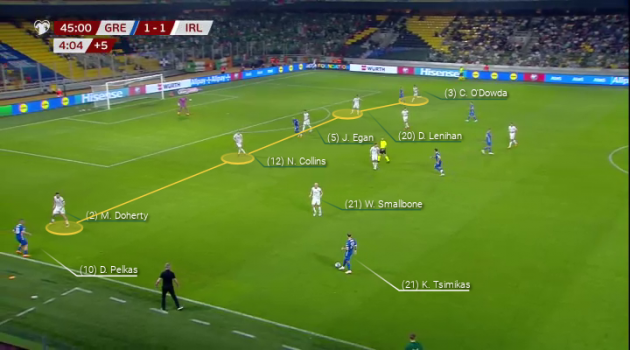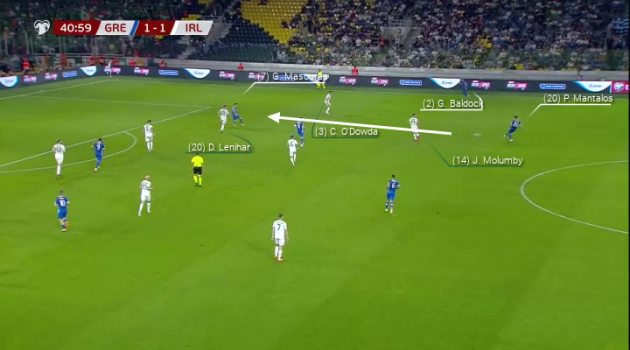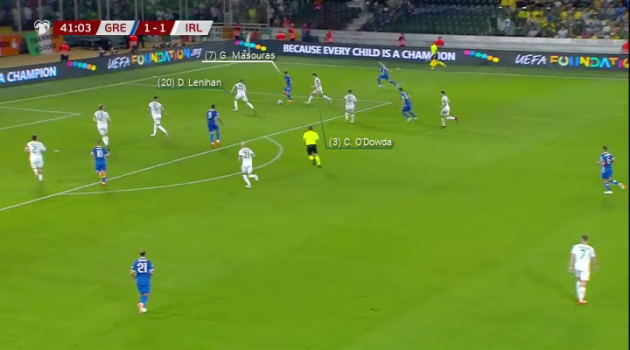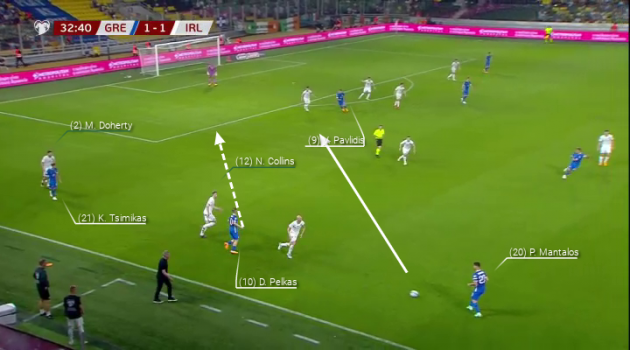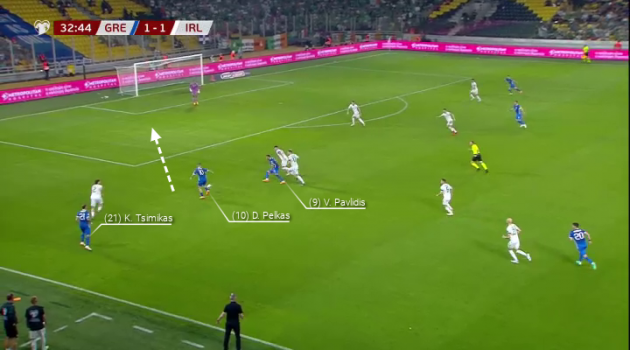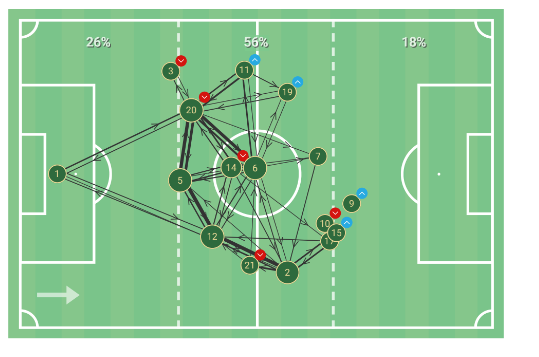AND SO THE wheel turns once more.
Having put in a creditable performance in defeat to a major nation, Ireland then followed it up with a flop against a side of their own level. It has happened before Stephen Kenny but the problem is it’s happening under his watch too. These are not the types of revolutions in which he was supposed to deal.
But with every crank of this grinding, repeating cycle, another bit of ground beneath Kenny’s feet is stripped away. He is now standing precariously on a thinner crust than ever before.
Not all members of the FAI board were enthused by his 2021 contract extension and now the support of his allies is waning. There was a sense of resignation among many of his vocal supporters in the away end in Athens last night, too.
The reason the defeat to Greece is so damaging is that it was a product of time and support: this was the targeted game in a campaign that was targeted years ago. The FAI duly signed off on expensive training camps in Bristol and Antalya on Kenny’s request in preparation for this game, but the outcome has left everyone feeling glumly shortchanged.
The nature of the defeat is worse than its fact because Ireland knew how Greece would play. Stephen Kenny had largely outlined it in a sit-down with journalists in Antalya and Gus Poyet told his pre-game press conference that Greece would not be changing their system. And yet Ireland were dismantled by an approach they anticipated, and there was no effective response to it in-game.
Mike Tyson said everyone has a plan until they get punched in the face: Ireland’s problem is they still had their plan after they dabbed the blood from their nose.
Greece won the game by stretching the pitch, and so their two wide attackers – Masouras and Pelkas – went to the touchline and pulled Ireland’s structure apart.
We asked Matt Doherty after the game whether Greece’s width hurt Ireland.
“Yeah I guess it did. We had to change at half-time, didn’t we? They were switching it to the left-back a lot, which was causing us problems. It wasn’t killing us as it was quite deep, but it’s just a domino effect of that happening, then something else happens, then someone else is out of position here and there.”
That domino effect is what overwhelmed Ireland.
“If the distances are too big and we are not doing things together and we get caught in between, then teams with players like that can punish you”, said Josh Cullen.
Greece made the pitch as big as it could possibly be, which allowed them to switch the play quickly and pull Ireland out of their shape, creating big spaces outside Ireland’s centre-halves, which proved to be their route to the winning goal.
Ireland contributed to this by effectively playing a back five, with the wing-backs (Doherty and O’Dowda) pressing onto Masouras and Pelkas. The result was that Ireland’s midfielders had to press out onto Greece’s advancing full-backs, which opened up gaps behind them. This was a particular kind of torture for Will Smallbone, who had a series of punishing shuttle runs out to Tsimikas whenever Greece switched the play.
Tsimikas naturally skipped by Smallbone with ease all night.
This image from first-half stoppage time shows how wide Greece were, and the space they created around Ireland’s centre-backs.
Hence Tsimikas’ first-half armchair ride.
Ireland could have adapted by asking a wing-back to push up on the Greek full-back in front of him (in this instance Doherty onto Tsimikas), and then having the opposite wing-back drop into a traditional full-back role and have the rest of the back three shuffle across to close up the gaps. This would also have kept Ireland’s midfield trio more compact and much harder to play through.
It would also have made it harder for Greece to play that constant out-ball to Tsimikas, which would have spared Smallbone some energy. (He was taken off before the hour mark, at the time his creativity was needed most.)
But Ireland were too rigid to adapt in this way and while Greece didn’t exploit the situation above, they did with others.
Only a brilliant Doherty block denied Pelkas a goal from a cut-back shortly before the break, and it came as O’Dowda was caught drifting too wide on the left as Molumby put zero pressure on Mantolas in possession. So he zipped a ball into the feet of Masouras, who gets in between O’Dowda and Lenihan and pulls the ball back to the penalty spot. Doherty averted the goal by throwing himself in front of Pelkas’ shot.
Pelkas’ awful finish ruined an earlier chance, with Nathan Collins caught miles out of position. This time Collins is attracted out to Pelkas, and Tsimikas cleverly pushes on to occupy Doherty.
With Collins slow to react, Mantolas pops a ball into the feet of Pavilidis, who instantly knocks it to Pelkas. His finish was the best thing that could be said about the move from an Irish point of view.
Mikey Johnston replaced Adam Idah at half-time and Ireland went to a 5-4-1, but it didn’t solve the problem, a fact made obvious by the goal. Wing-back O’Dowda continues to mark Masouras, and again it is a midfielder (Molumby) pressing out to the full-back, Baldock. Masouras then loses O’Dowda too easily, Johnston continues an Irish trend of not putting enough pressure on the man in possession, and that was the game.
Disastrous start to the second half for Ireland as Masouras finds the bottom corner after being played in by Greece captain Bakasetas. #Euro2024 #GREvIRL #RTESoccer
— RTÉ Soccer (@RTEsoccer) June 16, 2023
📺 Watch: https://t.co/4qNNceBCQB
📻 Listen: https://t.co/Vpls4Lx8IW
📱 Updates: https://t.co/lHOKS7jxfP pic.twitter.com/PqKK2hblk4
Molumby rightly gestures at Lenihan that he should have come across to fill the space, but had he been asked to sit rather than press out against Baldock he might have snuffed out the chance in the first place.
Ireland couldn’t get back in the game as their main creative force, Smallbone, had gone off, much of his energy wasted forlornly running out to Tsimikas.
Ireland were also desperately rigid in attack. The plan was to go down the right flank and use the link up play with Smallbone and Doherty, who combined well to win the corner from which Ireland scored. It’s not that this was a bad plan, but it was the only plan. A remarkable 77% of Ireland’s attacks came down the right wing, with just 4% coming down the left. It made Ireland much too predictable, and they completely failed to get Evan Ferguson into the game. He had just one single touch in the Greece penalty area, and that was the header from which Collins scored. Nothing can be a greater indictment of an attacking plan than the fact your goalscoring hero didn’t manage an open-play touch in the Greek box all night.
A look at their passing map from the game shows just what a non-event the Irish left flank was from an attacking point of view.
One of the issues here was a lack of distribution from centre-back: Lenihan is right-footed and his passing is not his main strength. His match sharpness was the reason he was picked over Dara O’Shea, but Ireland really missed O’Shea’s passing.
In fact, Ireland had virtually no passing outlet when Greece had to try and win the game: between Ireland’s equaliser and Greece’s winning goal, 25% of Ireland’s passes travelled further than 45 metres.
The defeat is not solely the fault of the manager. He couldn’t legislate for some of the terrible passes and decision-making of his players in the first half, none of whom approached their usual standards aside from Bazunu and possibly Ferguson.
Doherty issued a staunch defence of the coaching staff after the game. “Of course. We are prepared unbelievably well, they do everything for us”, he replied when asked if he still believed in the management team.
The level of their preparation is not in doubt, and Ireland’s game-plans for the biggest sides have been consistently correct under Kenny. But when they play a lower-ranked – and more humble – side, they have too often shown an inability to react to the questions asked of them.
The Greece defeat was a failure on Stephen Kenny’s own terms, and now he walks a perilous path.


